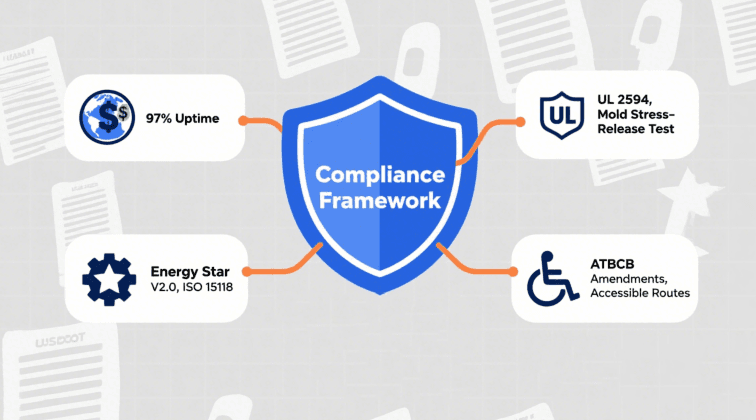ECS Navigates Complex US EV Charger Regulations to Bolster Overseas Operations

October 15, 2025 - EV CHARGE SOFTWARE (ECS), a leading overseas EV charger operation and maintenance platform, is closely monitoring and adapting to the evolving regulatory landscape in the United States. As the US ramps up efforts to expand its EV charging infrastructure, a complex web of federal, state, and local regulations has emerged, impacting everything from charger installation and operation to consumer access and safety. ECS, with its focus on providing seamless, compliant services, is leveraging its global expertise to help clients navigate these rules.
Federal Mandates: Power, Accessibility, and Interoperability
At the federal level, the US Department of Transportation (USDOT) has been a key driver of change. In 2024, the USDOT proposed a significant initiative, backed by $50 billion in government funding, aimed at standardizing EV charging infrastructure. This initiative has several far-reaching implications:
- Power Requirements: Charging stations receiving federal funds are now required to use direct-current (DC) fast chargers, with each station equipped with at least four ports, each capable of delivering 150 kilowatts or more. This ensures that EV drivers can access high-speed charging, reducing wait times and promoting long-distance travel.
- Eliminating Membership Barriers: To enhance consumer access, the rules prohibit charging stations from forcing users to register as members, streamlining the charging process.
- Interoperability and Standardization: All federally funded charging stations must be able to communicate and operate on a unified software platform. This not only improves efficiency but also allows for real-time data sharing, enabling third-party applications to display accurate charging station availability and status. Additionally, states are responsible for ensuring that these ports are operational for at least five years, with a 97% uptime requirement.
Safety-First Standards: UL and Energy Star
Safety remains a top priority in US EV charger regulations. The Underwriters Laboratories (UL) has developed several standards crucial for charger safety. For example, the UL 2594 standard, updated in 2016, covers a wide range of safety aspects for EV supply equipment (EVSE). It defines the output cable standards for connections to EVs, revises the definition of EVSE to align with technological advancements, and includes more accurate durability and safety tests, such as the mold stress-release distortion test.
The Environmental Protection Agency (EPA) also plays a role with its Energy Star program. In 2025, the EPA released the Energy Star V2.0 draft for EV chargers, introducing key changes. The maximum output current for AC Level 1 chargers was increased from 16A to 50A, and the DC charger coverage was extended from 350kW to 850kW. This expansion broadens the applicability of the Energy Star certification, benefiting manufacturers. The draft also aligns with the National Electric Vehicle Infrastructure (NEVI) program by adding a "plug-and-charge" definition and requiring compliance with ISO 15118 and Open Charge Point Protocol (OCPP) 2.0.1 or higher for chargers seeking Energy Star 2.0 certification.
Accessibility Regulations: Ensuring Inclusivity
In an effort to make EV charging accessible to all, the US government has introduced regulations related to the Americans with Disabilities Act (ADA). The US Architectural and Transportation Barriers Compliance Board (ATBCB) proposed amendments in 2024 to the ADA and the Architectural Barriers Act of 1968, specifically for EV charging stations. These amendments cover aspects such as the physical and communication access of chargers for disabled users, ensuring that charging spaces and the routes to them are compliant with accessibility standards.
Impact on ECS and the Industry
For ECS, these regulations present both challenges and opportunities. "The evolving regulatory environment in the US means we need to be even more vigilant in our service offerings," said [ECS CEO Name]. "We're working closely with our clients, whether they're charger manufacturers, station operators, or site hosts, to ensure full compliance. Our global technical support team, with its expertise in local languages, is helping clients understand and implement these regulations, from installing compliant chargers to setting up interoperable systems."
The regulations are also driving innovation in the industry. Manufacturers are now focusing on developing chargers that meet the high-power, safety, and accessibility requirements. For example, some are integrating features like advanced communication protocols to ensure seamless operation on the unified software platforms mandated by the USDOT, while also enhancing safety features to meet UL and Energy Star standards.
As the US continues to expand its EV charging network, ECS is well-positioned to help its clients navigate the regulatory maze, ensuring that the growth of the EV charging infrastructure is both compliant and efficient. With its focus on customization, technical support, and turn-key services, ECS aims to be at the forefront of helping the industry adapt to these new rules.
Contact & Next Steps
Interested in learning more about how ECS can help your EV charging business in the US comply with regulations?
- Reach out via email: [info@EVchargesoft.com]
- Visit the official website: [https://evchargesoft.com/]
About ECS (EV CHARGE SOFTWARE)
ECS is a global leader in overseas EV charger operation and maintenance platforms, dedicated to simplifying regulatory compliance and operational efficiency for clients worldwide. With a team of regulatory experts and technical engineers, ECS supports charger manufacturers, station operators, and site hosts across 30+ countries, helping them align with local rules while scaling their EV charging businesses.